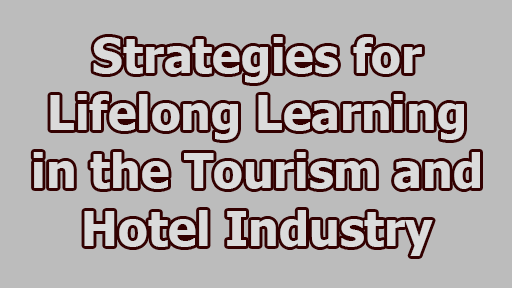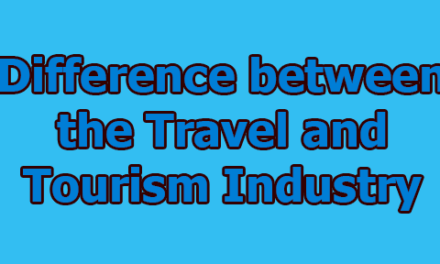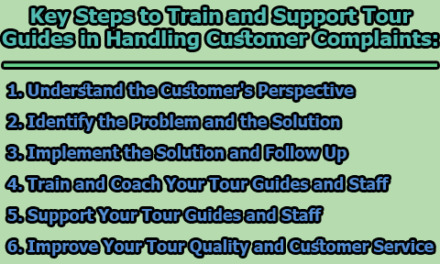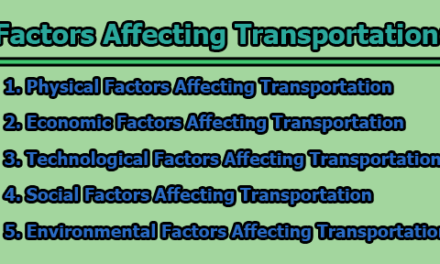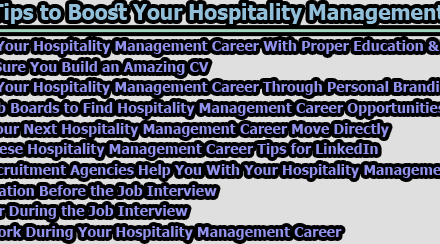Strategies for Lifelong Learning in the Tourism and Hotel Industry:
The tourism and hotel industry is renowned for its dynamism and ever-evolving nature, and professionals within this sector must continually adapt to meet the changing needs and expectations of global travelers. In this context, the adoption of lifelong learning strategies is not merely a choice but an imperative for career success. This multifaceted industry demands a diverse skill set and a deep understanding of customer service, cultural diversity, and the latest technological advancements. In this article, we delve into an array of strategies for lifelong learning in the tourism and hotel industry, recognizing that these strategies are pivotal to ensuring personal and professional growth, and to delivering a world-class guest experience.
1. Formal Education: Pursuing formal education is a fundamental lifelong learning strategy. It typically involves enrolling in degree programs or specialized courses related to the industry. For instance:
- Bachelor’s or Master’s Degrees: Enrolling in a Bachelor of Science in Hospitality Management or a Master of Business Administration (MBA) with a focus on tourism and hospitality can provide you with a strong foundation in the field.
- Specialized Courses: These may include certificate programs in revenue management, event planning, culinary arts, or hotel operations. These courses offer targeted knowledge and skills development.
Formal education not only deepens your understanding of the industry but also demonstrates commitment to potential employers, making you a more attractive candidate for management positions or specialized roles.
2. Certifications and Credentials: Industry-specific certifications and credentials are invaluable for demonstrating your expertise and professionalism in the tourism and hotel industry. Examples of relevant certifications include:
- Certified Hotel Administrator (CHA): This certification is offered by the American Hotel & Lodging Educational Institute (AHLEI) and showcases your knowledge of hotel management.
- Certified Hospitality Educator (CHE): Ideal for those interested in teaching or training roles within the industry, this certification is also provided by AHLEI.
- Certified Meeting Professional (CMP): Offered by the Events Industry Council, the CMP certification is excellent for professionals specializing in event planning and management.
Earning these certifications can open up new career opportunities and help you stand out in a competitive job market.
3. On-the-Job Training: On-the-job training is a practical, hands-on approach to lifelong learning. This strategy involves learning while working within the industry. Here’s how you can maximize this learning method:
- Cross-Training: Seek opportunities to work in different departments, such as front desk, housekeeping, food and beverage, and sales. This broadens your understanding of how the entire operation works and enhances your problem-solving skills.
- Shadowing: Shadow experienced colleagues, supervisors, or mentors to learn from their expertise.
- Project Work: Take on special projects that allow you to apply your knowledge and gain new skills.
On-the-job training is highly effective as it provides real-world experience and immediate application of learning, allowing you to adapt to the unique challenges of your specific workplace.
4. Mentorship and Networking: Mentorship and networking are powerful lifelong learning strategies in the tourism and hotel industry. They allow you to tap into the experiences and wisdom of seasoned professionals. Here’s how you can leverage these strategies:
- Mentorship: Seek out a mentor, ideally someone with extensive industry experience, who can provide guidance, share insights, and help you navigate your career path.
- Networking: Attend industry conferences, join professional associations like the American Hotel & Lodging Association (AH&LA) or the International Society of Hospitality Consultants (ISHC), and participate in online forums related to hospitality and tourism.
Building a strong professional network can provide opportunities for collaborative learning, job referrals, and access to valuable industry insights.
5. E-Learning and Online Courses: E-learning and online courses have become increasingly popular for lifelong learning in the tourism and hotel industry due to their convenience and accessibility. Key considerations include:
- Course Selection: Choose courses relevant to your current role or career goals. For example, if you’re a marketing manager, consider courses on digital marketing, SEO, and social media management.
- Self-Paced Learning: Online courses often offer the flexibility to learn at your own pace, making them suitable for busy professionals.
- Accredited Programs: Ensure that the courses or platforms you use are accredited or recognized within the industry to add credibility to your learning.
Online courses can be a cost-effective and time-efficient way to acquire new skills and stay updated on industry trends and best practices. Platforms like Coursera, edX, and LinkedIn Learning offer a wealth of course options.
6. Self-Study: Self-study is a valuable strategy for lifelong learning, especially when you want to delve into specific areas of interest within the industry. Here’s how you can make the most of self-study:
- Books and Journals: Explore textbooks, academic journals, industry publications, and bestselling books related to tourism, hotel management, and the broader hospitality field.
- Online Resources: Utilize blogs, podcasts, YouTube channels, and industry-specific websites created by experts and thought leaders.
Self-study allows you to set your own pace, focus on topics that interest you the most, and stay updated on the latest trends and research in the industry.
7. Language Skills: Language proficiency is an essential skill in the tourism and hotel industry, where you often deal with international travelers. Here’s how to develop your language skills:
- Language Courses: Consider enrolling in language courses or using language learning apps to improve your proficiency in languages commonly spoken by tourists.
- Cultural Awareness: Learning a language often goes hand in hand with gaining cultural insights, which can enhance your interactions with guests from different backgrounds.
Fluent communication in multiple languages can set you apart and improve the guest experience, as it allows for better rapport and customer service.
8. Soft Skills Development: Soft skills, such as problem-solving, communication, teamwork, and emotional intelligence, are integral to delivering excellent customer service in the tourism and hotel industry. Here’s how to hone these skills:
- Training Workshops: Attend workshops or courses specifically designed to improve soft skills, often offered by professional development organizations.
- Feedback and Self-Reflection: Continuously seek feedback from colleagues and guests to identify areas where you can improve your soft skills.
Investing in soft skills development can lead to more satisfied guests and stronger working relationships with colleagues and superiors.
9. Technology Proficiency: Proficiency with technology is critical in the modern tourism and hotel industry, as it impacts everything from reservations to guest experience. Here’s how to stay technologically adept:
- Training Programs: Participate in training programs provided by your organization or seek external training on the use of property management systems (PMS), customer relationship management (CRM) software, and online booking platforms.
- Stay Current: Regularly explore new technological advancements and tools, and learn how they can improve efficiency and guest satisfaction.
Being tech-savvy allows you to adapt to evolving industry trends and provides an edge in the competitive hospitality market.
10. Sustainability and Environmental Education: Sustainability is increasingly important in the tourism and hotel industry. Here’s how to educate yourself about eco-friendly practices and green certifications:
- Certifications: Consider earning certifications related to sustainability, such as LEED (Leadership in Energy and Environmental Design) or Green Key, which are recognized as industry standards.
- Workshops and Seminars: Attend workshops and seminars on sustainable practices in hospitality, such as waste reduction, energy conservation, and eco-friendly design.
Knowledge in sustainability not only aligns with growing customer expectations but also positions you as an advocate for responsible tourism and environmentally friendly practices.
11. Crisis Management and Safety Training: The tourism and hotel industry can face various crises, including natural disasters and pandemics. Being well-prepared and trained in crisis management and safety procedures is crucial. Strategies to build expertise in this area include:
- Crisis Simulations: Participate in crisis simulation exercises to practice decision-making and response strategies.
- Certifications: Consider certifications related to crisis and emergency management, like the Certified Emergency Manager (CEM) or certifications in first aid and CPR.
Expertise in crisis management and safety measures ensures the safety of guests and staff during unforeseen events.
12. Feedback and Continuous Improvement: Feedback and continuous improvement should be ongoing processes in the tourism and hotel industry. Strategies to embrace this include:
- Guest Surveys: Regularly collect and analyze guest feedback to identify areas for improvement.
- Performance Appraisals: Seek feedback from supervisors and conduct self-assessments to set personal and professional development goals.
This approach fosters a culture of learning, adaptability, and a commitment to providing the best possible guest experience.
13. Cultural Competency and Cultural Sensitivity: In a diverse and global industry like tourism, understanding different cultures, customs, and traditions is essential. Strategies to enhance cultural competency include:
- Cross-Cultural Training: Participate in cross-cultural training programs or workshops to gain insights into the preferences and expectations of guests from various cultural backgrounds.
- Travel and Immersion: Travel and immerse yourself in different cultures to deepen your understanding of diverse perspectives.
Cultural competency fosters a more inclusive and respectful environment for guests and colleagues.
14. Leadership Development: For those aspiring to leadership roles within the tourism and hotel industry, leadership development is essential. Strategies for leadership development include:
- Leadership Courses: Enroll in leadership development courses or programs to build essential skills such as decision-making, team management, and strategic planning.
- Mentorship: Seek out mentors who can provide guidance and advice on leadership and management strategies.
Developing leadership skills can open doors to managerial positions and empower you to lead teams effectively.
15. Budgeting and Financial Management: Proficiency in budgeting and financial management is essential in roles involving cost control, revenue management, and financial planning. Strategies to gain expertise in this area include:
- Financial Courses: Enroll in financial management courses or workshops to understand budgeting, cost control, and revenue optimization.
- On-the-Job Learning: Seek opportunities within your organization to work on financial projects and gain hands-on experience.
Sound financial management is vital to ensuring the financial success and sustainability of a tourism or hospitality operation.
16. Work-Life Balance and Stress Management: The tourism and hotel industry can be demanding, often involving long hours and high-pressure situations. Strategies for work-life balance and stress management include:
- Wellness Programs: Participate in wellness programs and activities provided by your organization.
- Time Management: Develop effective time management skills to balance work commitments with personal life.
Prioritizing work-life balance and managing stress contributes to personal well-being and long-term career sustainability.
17. Feedback Loops: Establishing feedback loops is a critical strategy for continuous improvement and staying relevant in the industry. These feedback loops involve ongoing assessment and adjustment of your learning strategies. Here’s how to implement them effectively:
- Self-Assessment: Regularly evaluate your own performance, skills, and knowledge. Ask yourself questions like, “What areas can I improve?” and “What skills should I focus on next?”
- Solicit Feedback: Seek feedback from colleagues, supervisors, mentors, and even guests. Constructive feedback can provide insights into areas of strength and areas that need development.
- Learning Evaluation: Assess the effectiveness of your learning strategies. Are the courses you’re taking leading to tangible improvements in your performance and career prospects? Are you meeting your goals for professional development?
Feedback loops ensure that your lifelong learning journey is a dynamic and adaptive process. By continuously refining your approach based on feedback, you can maintain your edge and respond to changing industry demands effectively.
In conclusion, in the fast-paced world of tourism and hospitality, the quest for knowledge and skill enhancement should be perpetual. The strategies for lifelong learning discussed here encompass a wide spectrum of approaches, from formal education to feedback-driven improvement. The synthesis of these strategies allows professionals in the industry to remain agile, adaptable, and attuned to the ever-changing landscape of guest preferences and industry trends. In embracing these lifelong learning strategies, individuals not only fortify their own careers but also contribute to the continued excellence and innovation that define the tourism and hotel industry. Ultimately, it is through these strategies that the industry not only survives but thrives in an increasingly competitive and interconnected global landscape.
References:
- Amoah, V. A., & Baum, T. (1997). Tourism education: Policy versus practice. International Journal of Contemporary Hospitality Management, 9(1).
- Bahtijarevic-Siber, F. (1999). Menadzment ljudskih potencijala. Golden marketing.
- Boekaertes, M. (1997). Self-Regulated Learning: A new Concept Embraced by Researchers Policy Makers Educators Teachers and Students. Learning and Instruction, 7(2).
- Chapman, J. A., & Lovell, G. (2006). The Competency model of hospitality service: Why it doesn’t deliver. International Journal of Contemporary Hospitality Management, 18(1).
- Costa, J., & Ferrone, L. (1995). Sociocultural perspectives on tourism planning and development. International Journal of Contemporary Hospitality Management, 7(7).
- Dale, C., & Robinson, N. (2001). The theming of tourism education: a three domain approach. International Journal of Contemporary Hospitality Management, 13(1).
- Kroo, N. (1999). The European House of Education: Education, Research, Industry. In K. Heinz (Ed.), The EHE: Education and Economy – a new partnership. Conference of European Ministers of Education: Budapest 24-26 June 1999.
- Lickorish, L. J., & Jenkins, C. L. (2003). An introduction to Tourism. Butterworth-Heinemann.
- Littlejohn, D., & Watson, S. (2004). Developing graduate managers for hospitality and tourism. International Journal of Contemporary Hospitality Management, 16(7).
- McDonald, M. L., & Hopkin, R. O. (2003). The future of hospitality education in Grenada. International Journal of Contemporary Hospitality Management, 15(3).
- Morgan, M. (1996). Marketing for Leisure and Tourism. Prentice Hall.
- Morrison, A., & O’Mahony, G. B. (2003). The liberation of hospitality management education. International Journal of Contemporary Hospitality Management, 15(1).
- Peters, M., & Buhalis, D. (2004). Family hotel businesses: strategic planning and the need for education and training. Education+Training, 46(8-9).
- Poikela, E. (2004). Developing criteria for knowing and learning at work: towards context-based assessment. The Journal of Workplace Learning, 16(5).
- Ramos, V., Rey-Maquieira, J., & Tugores, M. (2004). The role of training in changing an economy specializing in tourism. International Journal of Manpower, 25(1).
- TOUR Operators Initiative. (2003). Sustainable tourism: The Tour Operator’s Contribution. Tour Operation Initiative.
- Tronfio, M., Petruzzellis, L., & Nigro, C. (2006). Tour operators and alternative tourism in Italy. International Journal of Contemporary Hospitality Management, 18(5).

Library Lecturer at Nurul Amin Degree College

